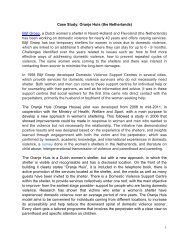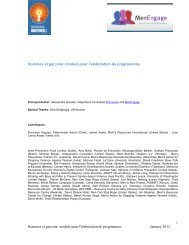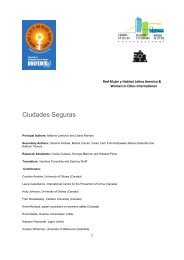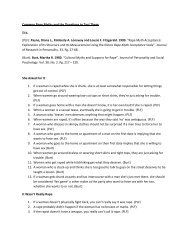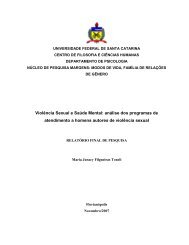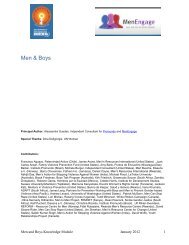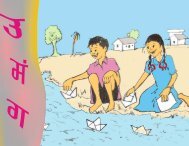Campaigns to End Violence against Women and Girls - Virtual ...
Campaigns to End Violence against Women and Girls - Virtual ...
Campaigns to End Violence against Women and Girls - Virtual ...
You also want an ePaper? Increase the reach of your titles
YUMPU automatically turns print PDFs into web optimized ePapers that Google loves.
Read more in the publication: Gaye, O., Using Popular Theatre <strong>to</strong> Break the Silence<br />
Around <strong>Violence</strong> Against <strong>Women</strong>, Réseau Africain pour le Dévelopement Integré, 2004<br />
(in English <strong>and</strong> French).<br />
� For more tips, consult the Guide <strong>to</strong> Interactive Drama for Sexual <strong>and</strong><br />
Reproductive Health with Young People by the International HIV/AIDS Alliance<br />
(2008). The international Theatre of the Oppressed Organization provides links <strong>to</strong><br />
Forum Theatre practitioners around the world. Many groups provide training for<br />
social activists.<br />
Demonstrations<br />
Demonstrations, marches <strong>and</strong> rallies are potentially powerful ways of expressing public<br />
feeling on an issue. In communities they can be part of local-level political advocacy<br />
(e.g. <strong>to</strong> protest <strong>against</strong> a judgment which has failed <strong>to</strong> punish a rapist) or a celebration or<br />
commemoration (e.g. International <strong>Women</strong>’s Day, a campaign launch). Please refer <strong>to</strong><br />
Demonstrations, marches, rallies for step-by-step guidance on when <strong>and</strong> how <strong>to</strong><br />
organize these.<br />
Film screening <strong>and</strong> participa<strong>to</strong>ry video production<br />
Meetings involving a video or film screening can attract large audiences in contexts<br />
where people do not have easy access <strong>to</strong> television. Using mobile power units <strong>and</strong><br />
simple equipment, you can show films virtually anywhere.<br />
A particularly powerful way <strong>to</strong> stimulate discussion is digital video production by, or with<br />
the participation of, community members. Both the product <strong>and</strong> the process of videomaking<br />
stimulate critical thought <strong>and</strong> discussion among participants <strong>and</strong> viewers, who<br />
are emotionally engaged by seeing themselves <strong>and</strong> other community members on<br />
screen. To draw maximum benefit from video production, make sure women <strong>and</strong> girls<br />
from the community play leading roles in it. For guidance <strong>and</strong> <strong>to</strong>ols on producing videos,<br />
see Video, Film, Radio under Audio-visual media in this module.<br />
Example: The ‘Through Our Eyes’ participa<strong>to</strong>ry video initiative was piloted in<br />
Guinea <strong>and</strong> Liberia in 2005 by the American Refugee Committee (ARC) in collaboration<br />
with Communication for Change. Project activities began with a two-week training<br />
workshop in participa<strong>to</strong>ry video carried out at Lainé refugee camp (Guinea) for ARC field<br />
staff <strong>and</strong> members of camp committees responsible for referring sexual <strong>and</strong> gender<br />
based violence cases <strong>to</strong> ARC. Participants learned how <strong>to</strong> use the equipment, engage<br />
community members, carry out interviews <strong>and</strong> develop team skills in programme<br />
planning <strong>and</strong> filming. At the end of the training course they made a documentary on<br />
early/ forced marriage <strong>and</strong> short dramas on rape <strong>and</strong> community response <strong>to</strong> domestic<br />
abuse.<br />
Liberia-based ARC staff returned home with their video equipment <strong>and</strong> proceeded <strong>to</strong><br />
share their skills with community peers who had been trained in SGBV prevention <strong>and</strong><br />
response. This new team soon produced their first video: a profile of a local man, a<br />
former alcoholic who used <strong>to</strong> abuse his wife but who had overcome his addiction <strong>and</strong><br />
become a responsible husb<strong>and</strong> <strong>and</strong> father.<br />
Community screenings – ‘playbacks’ – of the team’s video productions have prompted<br />
many individuals <strong>to</strong> seek ARC services. Community peers <strong>and</strong> field staff open the<br />
sessions by describing ARC’s gender based violence-related programme <strong>and</strong> services.<br />
237<br />
<strong>Campaigns</strong> December 2011



